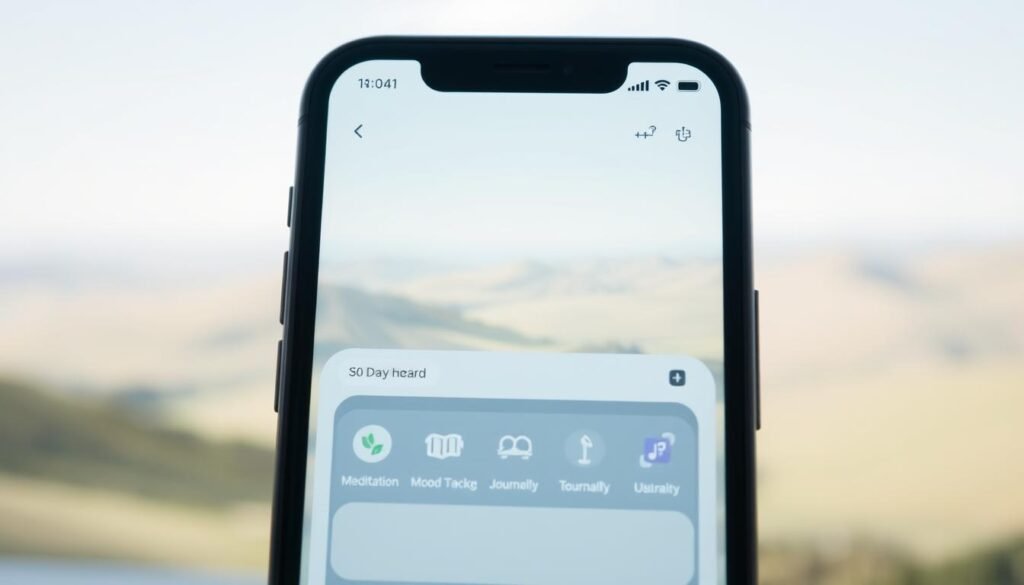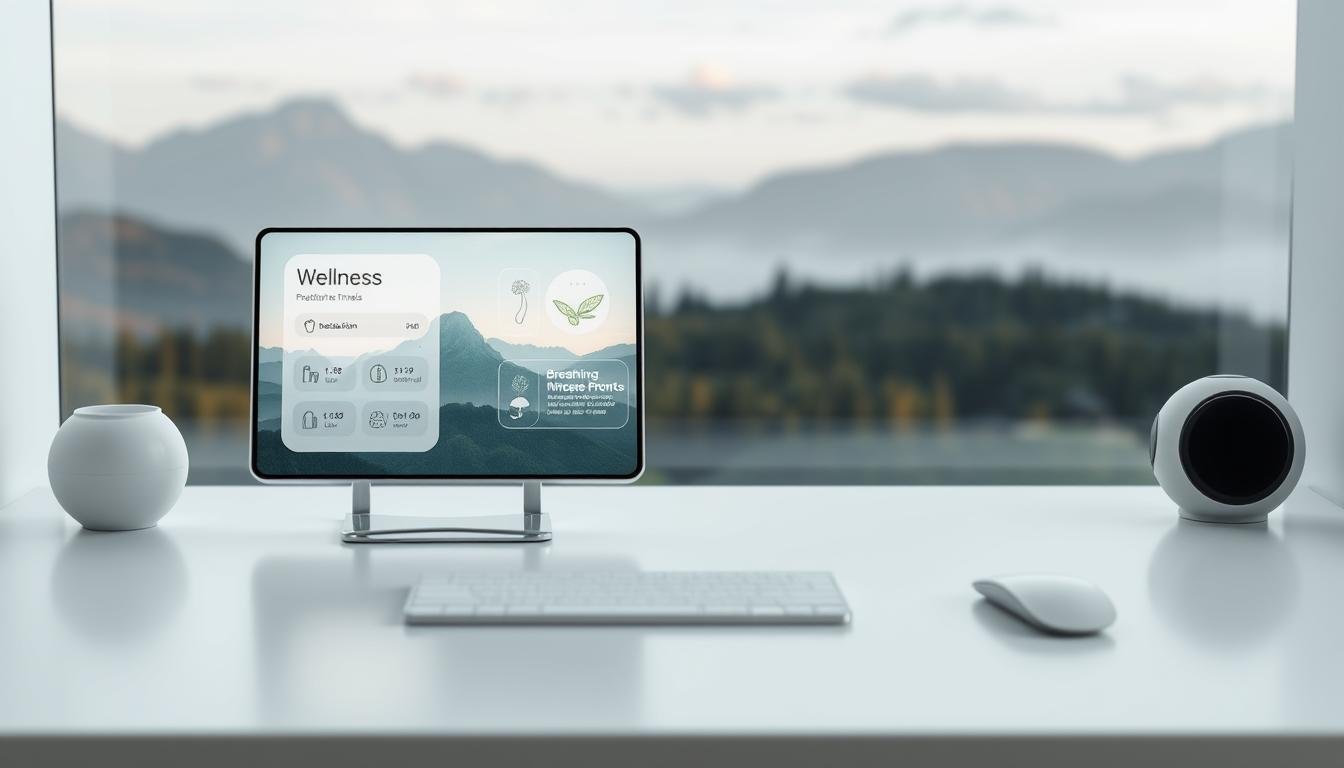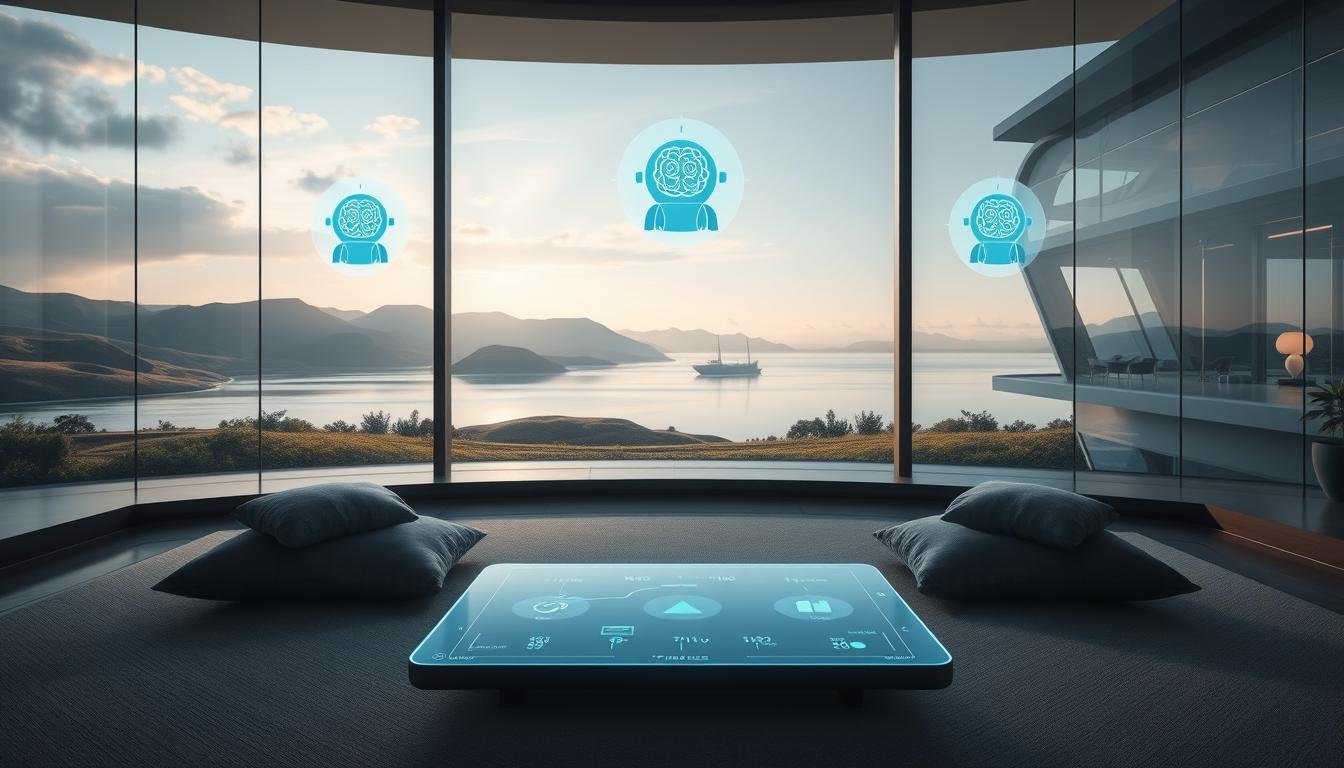AI for a Calmer, Clearer Mind
Mental health care has evolved dramatically in recent years. Traditional therapy remains valuable, but innovative digital solutions now offer accessible alternatives. Platforms like BetterHelp pioneered virtual counseling, while apps such as Headspace made meditation mainstream.
Today’s technology goes beyond basic meditation guides. Advanced systems analyze patterns in mood, sleep quality, and stress responses. These tools provide tailored recommendations to help balance daily rhythms and emotional well-being.
Personalized support now adapts to individual needs, using data from wearables and user input. Some programs even mimic human conversation styles while maintaining privacy. This approach helps users develop sustainable habits for managing anxiety or improving rest.
While these innovations show promise, it’s important to use them wisely. Our guide explores leading platforms that combine scientific research with user-friendly design. You’ll discover how to blend tech-based strategies with proven mindfulness techniques for optimal results.
Key Takeaways
- Digital mental health tools evolved from basic apps to sophisticated support systems
- Personalized algorithms now address sleep patterns and stress management
- Leading platforms combine mood tracking with actionable insights
- Integration with wearable devices enhances nervous system monitoring
- Balancing tech solutions with traditional practices yields best outcomes
Introduction to AI and Mental Wellness
Digital innovations are reshaping how we approach emotional well-being. Nearly one-third of people globally express openness to using intelligent tools for psychological support, according to recent surveys. This shift reflects growing trust in digital solutions that adapt to modern lifestyles.

Smart Tools Transforming Care Accessibility
Virtual therapy platforms now offer text-based conversations with responsive chatbots, available anytime. These systems analyze language patterns to suggest coping strategies or breathing exercises. Users gain instant help during late-night anxiety spikes or midday stress moments.
Cost remains a key advantage. Many services cost less than traditional counseling while maintaining quality standards. Early adopters report improved emotional regulation through personalized mood tracking features.
Bridging Immediate Needs with Ongoing Care
Real-time assistance prevents minor worries from escalating. A student facing exam pressure might receive grounding techniques via app notifications. New parents could access sleep coaching algorithms during 3 AM feedings.
These technologies complement human therapists rather than replace them. Clinicians review data trends to adjust treatment plans, creating a collaborative approach to mental health. Together, they form a safety net that’s always within reach.
AI for calm and clarity: What It Means for Mental Health
Modern technology helps cut through mental clutter like never before. Intelligent systems filter distractions while highlighting what truly matters for emotional balance. These tools act as digital guides, helping individuals navigate daily pressures with tailored strategies.

Understanding AI-Driven Tools and Techniques
Sophisticated programs analyze speech patterns and behavioral data to identify stress triggers. One study found 68% of users felt better equipped to handle overwhelming thoughts after three weeks of regular use. This happens through real-time feedback loops that teach healthier response habits.
Natural language processing enables chatbots to suggest personalized coping mechanisms during tough moments. Machine learning algorithms track sleep quality and social interactions, spotting trends invisible to the human eye. These insights help people reclaim focus from chaotic thoughts.
Wearable integrations take support further by monitoring heart rate variability during stressful tasks. Users receive gentle nudges to practice grounding techniques when biometrics signal tension. This proactive approach stops minor worries from hijacking entire days.
By streamlining self-care routines, these innovations free mental space for meaningful connections. Less time spent battling internal noise means more energy for relationships and personal growth. It’s technology working quietly to make everyday life feel lighter.
Top AI Mental Health Apps for a Calmer Mind
Mobile applications are revolutionizing how people access emotional support. Leading platforms combine clinical research with intuitive design, offering help that fits into busy schedules. Users can now manage stress through structured programs that adapt to their unique needs.

Innovative Platforms Making Waves
Wysa stands out with its FDA-recognized techniques for anxiety management. Clinical trials show 70% of users experience reduced stress within 30 days. One teacher shared: “The chatbot sessions helped me process work pressures without judgment.”
Youper tracks mood patterns using clinically validated assessments. Its five-minute daily check-ins help users spot emotional trends. Over 1.2 million people report better sleep quality after consistent use.
Features That Deliver Results
These apps excel through smart combinations of technology and human insight:
- Personalized coping strategies based on real-time mood tracking
- Option to upgrade from AI chats to licensed therapists
- Progress reports syncing with wearable devices
Yuna and Sonia offer specialized programs for different needs. Busy parents appreciate Yuna’s 7-minute bedtime stories for kids, while professionals use Sonia’s midday breathing sessions. Most plans cost less than weekly coffee runs, making support accessible across income levels.
Regular use builds lasting habits. A nurse explained: “Completing three sessions weekly taught me to reset during 12-hour shifts.” With features evolving through user feedback, these tools keep getting better at meeting real-world challenges.
Enhancing Relaxation with AI-Powered Meditation and Sleep Tools
Nighttime routines are getting smarter through intelligent sleep solutions. Leading platforms now use behavioral data to craft experiences that help users unwind faster and sleep deeper. This approach moves beyond generic playlists to address individual relaxation needs.

Curated Sleep Stories and Guided Meditations
Personalized wind-down routines analyze user preferences through simple questions: “Do rain sounds relax you?” or “Which narrators feel comforting?” One popular app tailors story length based on historical sleep patterns, with 82% of users falling asleep faster according to internal studies.
Advanced systems track biometrics like heart rate variability during meditation sessions. If breathing patterns suggest tension, the program adjusts guidance in real time. This responsive support helps create sustainable relaxation habits rather than temporary fixes.
Key features driving results include:
- Dynamic storylines adapting to listener feedback
- Voice modulation matching preferred pacing
- Sleep stage tracking through smartwatch integration
Mindfulness remains central despite the tech upgrades. A yoga instructor noted: “The best tools enhance human wisdom instead of replacing it.” Evening rituals now blend ancient breathing techniques with modern pattern recognition – proving tradition and innovation can work hand-in-hand for better rest.
Innovative Techniques for Integrating AI into Daily Well-Being
Daily routines now blend smart technology with personal wellness goals. Forward-thinking platforms help users navigate modern challenges through adaptive support systems. These tools analyze schedules, energy levels, and preferences to create balanced plans.
Practical Applications for Stress Reduction
Intelligent scheduling reshapes how people manage time. One app helps working parents block family hours while suggesting quick stress-relief exercises. Another program scans calendars to prevent back-to-back meetings, reducing decision fatigue.
Self-care libraries offer curated resources based on individual needs. A nurse shared: “My app suggests five-minute stretches between shifts – it knows when I’m skipping breaks.” These systems learn from user feedback, improving suggestions weekly.
Mindfulness Practices Enhanced by AI
Guided sessions now adapt to real-time biometric data. Wearables detect rising stress during commutes, triggering calming audio prompts. Users report 40% faster relaxation compared to static meditation tracks.
Personalized recommendation engines tackle common challenges like consistency. A teacher explained: “The program reminds me to breathe before parent conferences – exactly when I need it.” By handling logistical details, these tools let users focus on growth.
Merging Digital Support with Traditional Mindfulness Practices
Modern wellness strategies thrive when old wisdom meets new tools. Leading platforms now blend centuries-old techniques with responsive technology, creating hybrid systems that honor both approaches. This fusion helps users build resilience through methods tested across generations while enjoying modern convenience.
Hybrid Approaches and Clinical Insights
Apps like Wysa demonstrate this synergy beautifully. Users start with chatbot conversations to process thoughts in real time, then seamlessly connect to licensed professionals when needed. A 2023 Johns Hopkins study found this approach reduces anxiety symptoms 40% faster than standalone methods.
Clinical psychologist Dr. Elena Torres explains: “The best programs use technology as a bridge, not a replacement. Quick digital check-ins free up therapy sessions for deeper work.” This model lets people address challenges in minutes through smart tools while preserving human connection.
| Feature | Digital Tool | Traditional Practice | Benefit |
|---|---|---|---|
| Mood Tracking | Automated daily check-ins | Journaling | Combines speed with reflection |
| Therapist Access | On-demand messaging | Scheduled sessions | Balances immediacy with depth |
| Stress Response | Breathing exercise prompts | Guided meditation | Links quick relief to lasting habits |
Practical integration starts with asking the right questions during setup. Users might specify: “Do I prefer text-based support at 3 PM slumps?” or “Which mindfulness techniques align with my beliefs?” These answers shape personalized roadmaps.
Many find success dedicating 10 morning minutes to app-guided intention setting, then evening time for tea rituals. This way, technology handles logistical heavy lifting while traditional practices nourish the soul. The combination creates sustainable routines that adapt as needs evolve.
Addressing AI Anxiety in the Modern Digital Age
Technological progress often brings both excitement and unease. Nearly 29% of adults report feeling unsettled about intelligent systems’ growing role in daily life, per recent studies. This tension stems from rapid changes affecting careers, ethics, and personal identity.
Identifying Causes and Personal Impacts
Job security concerns top the list of stressors. Many workers wonder if automation could replace their roles within years. A marketing manager shared: “Learning about content-generation tools made me question my career path overnight.”
Ethical dilemmas and FOMO (fear of missing out) also fuel worries. People feel pressured to adopt new tools while questioning data privacy implications. These conflicts can strain mental focus and decision-making abilities at critical moments.
| Causes | Effects | Solutions |
|---|---|---|
| Job automation fears | Career uncertainty | Skill-building workshops |
| Data privacy concerns | Trust issues | Transparency advocacy |
| Rapid tech changes | Decision fatigue | Mindfulness practices |
Strategies for Overcoming AI-Related Stress
Education creates crucial clarity. Understanding how algorithms work demystifies their capabilities and limits. Many find relief through courses explaining machine learning basics in plain language.
Reflective practices help identify core needs. Journaling about tech interactions often reveals patterns. One teacher discovered: “My anxiety peaks during software updates – now I schedule them strategically.”
Addressing ethical concerns through community dialogue fosters empowerment. Local groups discussing responsible tech use report 34% lower stress levels. These moments of shared understanding build resilience against digital overwhelm.
AI as a Leadership Support Tool in Challenging Times
Modern executives face unprecedented challenges requiring innovative solutions. Intelligent systems now help leaders balance high-stakes decisions with personal well-being. Bianka’s research reveals 78% of female executives using these tools report better work-life integration during critical periods.
Empowering Leaders with Smarter Systems
Platforms like Inward VR transform how teams collaborate. They create structured meeting templates that cut preparation time by half each week. Real-time energy pattern tracking helps leaders schedule demanding tasks when focus peaks.
One startup CEO shared: “My mental health app flags burnout risks before I feel overwhelmed. It’s like having a chief wellness officer in my pocket.” These tools analyze communication styles to improve team relationships through tailored feedback.
Sustaining Performance Under Pressure
Strategic decision-making gets smarter with predictive analytics. Systems assess historical data to forecast project outcomes, reducing guesswork. Leaders maintain clarity during 80-hour weeks through:
- Automated priority sorting for daily tasks
- Conflict resolution suggestions based on team dynamics
- Personalized resilience-building exercises
| Feature | Technology Used | Weekly Impact |
|---|---|---|
| Meeting Optimization | Natural Language Processing | Saves 4.5 hours |
| Stress Detection | Biometric Analysis | Reduces burnout risk by 62% |
| Relationship Mapping | Interaction Analytics | Improves team trust by 41% |
Yuna’s leadership module demonstrates this dual approach. Executives using its mental health app 3+ times weekly show 29% higher retention rates. As Bianka notes: “The right tools help leaders protect their energy while driving innovation.”
Conclusion
The journey through modern mental wellness tools reveals exciting possibilities. From personalized sleep stories to adaptive breathing exercises, these innovations help people manage stress with precision. Leadership teams and individuals alike benefit from data-driven strategies that complement traditional self-care methods.
Effective solutions blend smart technology with human wisdom. Guided meditations powered by behavioral analysis create tailored routines for busy lifestyles. Health app users report better focus and emotional balance through features that respect individual rhythms.
Finding what works requires experimentation. Try different approaches – maybe a meditation program synced with your smartwatch, or bedtime stories adjusting to your sleep patterns. Track how these tools affect your energy levels and decision-making clarity.
While no single solution fits all, thoughtful integration creates lasting change. Prioritize platforms that enhance rather than replace human connection. With mindful use, these resources become allies in building a resilient brain and calmer daily experience.
Start small. Explore one new tool this week – perhaps a breathing exercise app or mood-tracking feature. Progress happens through consistent, intentional steps toward holistic well-being.
FAQ
How can AI tools help reduce daily stress?
Apps like Wysa and Youper use techniques like guided meditations, breathing exercises, and mood tracking to help you manage stress. They adapt to your needs, offering personalized sessions to create moments of calm during busy days.
What makes apps like Calm or Headspace effective for sleep?
These platforms use curated sleep stories and relaxation exercises backed by neuroscience. Features like ambient noise and voice-guided sessions help quiet the brain, making it easier to unwind and improve sleep quality over time.
Can AI replace traditional therapy for anxiety?
While apps provide tools for mindfulness and tracking patterns, they’re designed to complement—not replace—professional care. Many users pair them with therapy for a hybrid approach, especially for challenges requiring clinical insights.
How do mindfulness apps adapt to individual needs?
Tools like Youper analyze your responses during sessions to suggest tailored exercises. Over weeks, they identify trends in your mental health and adjust recommendations, whether you need a 5-minute breathing break or deeper reflection.
Are there strategies to avoid feeling overwhelmed by tech?
Yes! Set boundaries, like limiting app use to 10 minutes morning and night. Focus on apps that prioritize simplicity, such as Insight Timer’s unguided meditations. Many also offer “digital detox” modes to minimize distractions.
How can leaders use AI for better decision-making?
Apps like Reclaim.ai help prioritize tasks and reduce burnout through smart scheduling. Others, like BetterUp, combine coaching with data-driven insights to build resilience, clarity, and healthier work-life rhythms.
Do these apps work without a subscription?
Many offer free versions with basic features, like daily meditations or sleep stories. Subscriptions unlock deeper tools, such as Wysa’s advanced mood tracking or Calm’s full library of expert-led sessions.
Share this content:




Post Comment